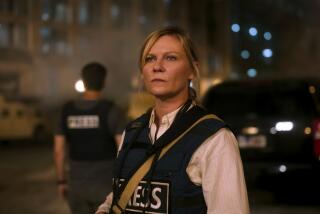Hollywood takes on the Civil War
When South Carolina artillerymen opened fire on a small band of federal troops garrisoned in Ft. Sumter exactly 150 years ago Tuesday, the American Civil War officially began. Now Hollywood is getting ready to fight the nation’s bloodiest conflict all over again with a passel of new sesquicentennial-ready film and TV projects from some of the biggest names in the entertainment industry, including directors Steven Spielberg, Ridley Scott and Robert Redford. There’s even a pilot for a TV series set against the backdrop of the war, from one of the executive producers of ABC’s hit drama “Lost.”
Of course, the war between the North and South over slavery and states’ rights has for decades supplied a bottomless well of drama — and potential profit — for storytellers. But the new wave of projects is coming at a time when researchers raised in the post-Vietnam era have revolutionized Civil War scholarship with a richer, and darker, understanding of a struggle most Americans probably still know best from high-school history courses.
“The Civil War is the most important event in American history,” Ken Burns, the documentary filmmaker whose landmark 1990 series about the conflict was rerun on PBS stations last week, said in an interview. “Everything that came before the Civil War led up to it; everything since has been, in many ways, a direct consequence of it.”
Details of much of the new writing is under wraps and in other cases still evolving, but whatever material is produced is bound to help re-shape Hollywood’s legacy on an endlessly reinterpreted crisis in the country’s history. It’s still unclear, for example, how the new fare will deal with the subject of race, which has occupied historians for decades over its precise role in the conflict, but which popular entertainment has largely skirted.
“Hollywood has a frankly terrible history with the Civil War,” said David W. Blight, a Yale historian currently on a fellowship at the Huntington Library in Pasadena, whose 2001 book “Race and Reunion: The Civil War in American Memory” exploded many of the myths associated with the postwar Reconstruction period.
A key problem, Blight noted, was the “Lost Cause” mythology, which was promoted by Southern writers in the late 19th and early 20th centuries, and depicted the Confederacy as a noble and idyllic civilization vanquished by impossible odds. In some viewers’ minds, the notion of sumptuous plantations filled with contented, wisecracking slaves still persists.
“‘Gone With the Wind’ laid that down in cinematic terms, so that you can probably never pull its roots out,” Blight said.
In the last 20 or 30 years, though, scholars who lived through the country’s Vietnam experience began to look at the much more-distant Civil War through a new lens.
“When the Vietnam generation began to study the Civil War we got a darker story — we got to the prisons, the question of death, the common soldiers’ brutal experience,” Blight said.
The cable network History is perhaps making the biggest bet, or at least the longest. History executives — who haven’t exactly ignored the Civil War in the past — plan to devote splashy special programming to the war over the next four years, which is how long the original conflict lasted. Next month, the channel will kick things off with “Gettysburg,” a two-hour documentary enhanced with CGI and reenactments from filmmaking brothers Ridley and Tony Scott. A panoramic view of the war’s crucial battle over three days in July 1863, the film is designed to give a grunt’s-eye, and sometimes gruesome, view of the action.
“You’re gonna be looking at what it was really like to be with these guys on the ground,” said Dirk Hoogstra, senior vice president of programming and development for History.
History has also scheduled a documentary on Robert E. Lee and Ulysses S. Grant, the best-known Confederate and Union generals, and formed an educational and charity initiative with the Civil War Trust and the National Park Foundation.
And just to make sure no viewer fails to get the message, the network is even adding special Civil War-themed episodes of series such as “Pawn Stars” and “American Pickers.”
For History, the war is a natural for its heavily male-skewing audience. “We’ve done just about everything you can possibly imagine on the Civil War a couple of times,” Hoogstra said, only half-joking. But programming related to the conflict nearly always pulls good ratings, he added.
Elsewhere, where the written record meets imagination, producers are hoping to pick up where the facts leave off with several new dramatized accounts of the war.
This Friday sees the premiere of Redford’s “The Conspirator,” with Robin Wright as Mary Surratt, the boarding house proprietor who was accused of aiding John Wilkes Booth in his plot to kill Abraham Lincoln in April 1865. Spielberg is reportedly set to start shooting this fall on his long-delayed film “Lincoln,” with Daniel Day-Lewis in the title role (Liam Neeson dropped out last year).
Those projects hinge on some of the most famous characters in American history; elsewhere, producers are using the war as a backdrop for invented protagonists.
Carlton Cuse, an executive producer on “Lost,” has been writing the pilot for the Civil War drama “Point of Honor” with Randall Wallace, the screenwriter of “Braveheart.” While Cuse sees his story as primarily a family drama — it’s about the travails of a Virginia clan in their battle-scarred homeland — the staggeringly high death toll of the war (620,000 by many counts) combined with its uniquely American roots make it an enduring object of fascination.
“I’ve had so many people come up to me and say, ‘I have diaries in my attic and papers and photographs of family members who fought in the Civil War,’” Cuse said. “It’s because it was a war fought on our soil.”
How critics and audiences will react to the new takes on the war remains to be seen. Burns’ “The Civil War” won wide acclaim from historians and audiences alike for personalizing history with the help of letters, diaries and other documents. The miniseries was also hailed for its forthright treatment of race relations, class distinctions and other topics often skipped over in movie treatments.
But elsewhere, filmmakers have often struggled to dramatize this chapter of American history. Films such as the 1939 epic romance “Gone With the Wind,” the notorious silent film “The Birth of a Nation” and the 1940 faux-western “Santa Fe Trail” with Ronald Reagan greatly distorted the historical record — with many viewers accepting their myths as the real story.
The 1989 feature “Glory,” about a black unit that fought for the Union, was considered revelatory for its treatment of a topic many Americans knew little about, Blight said. (History, too, has aired programs about that same black unit depicted in the movie, the 54th Massachusetts Voluntary Infantry.)
But he added that the nation has had a deeply rooted tendency to sublimate troubling thoughts about race relations with easier, more comforting notions, such as the “mutual valor of soldiers.”
How much of this new thinking will permeate the new works about to be unleashed? Hard to say, but it’s clear that filmmakers are no closer to running out of Civil War ideas than are historians. Likewise, the former group will keep taking liberties with the known truth in their quest for a larger Truth.
Historians say the Civil War can survive that, as long as the facts don’t get completely buried. As Burns put it: “Let’s remember that William Shakespeare took liberties with historical fiction and created the greatest literature on Earth.”
scott.collins@latimes.com
More to Read
The complete guide to home viewing
Get Screen Gab for everything about the TV shows and streaming movies everyone’s talking about.
You may occasionally receive promotional content from the Los Angeles Times.







